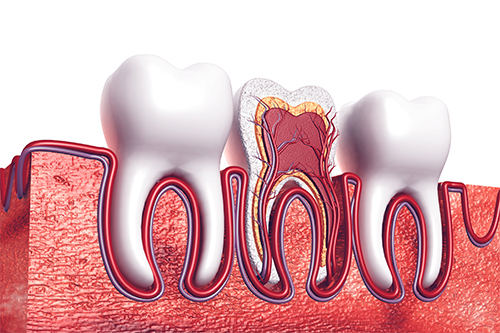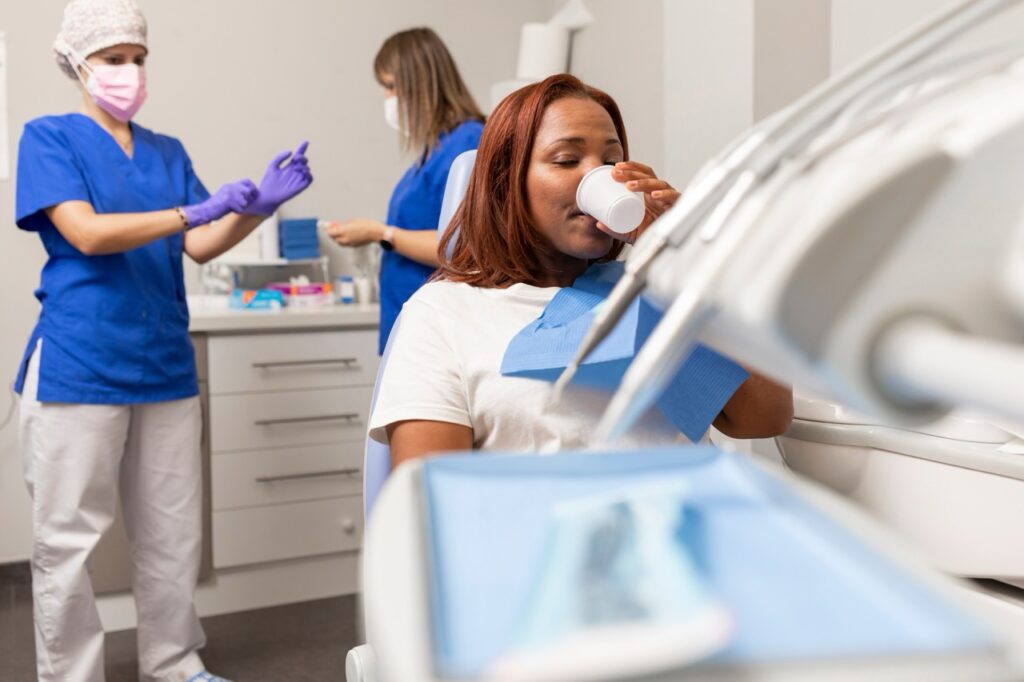Resource Library
Start Reading

Many patients at Penn Dental Family Practice (PDFP) ask, “Does a root canal hurt?” Few dental procedures cause as much apprehension or are the focus of so much misunderstanding.
Since the 1920s, for instance, the idea that bacteria can “leak” into the body during root canal therapy to cause degenerative diseases like arthritis and heart disease (an idea known as “focal infection theory”) has worried patients. However, a century of peer-reviewed scientific evidence has conclusively debunked this theory.
Even so, misinformation about and mistrust of root canals persist. As recently as 2019, more survey respondents feared root canals (59%) than public speaking (57%), spiders (55%), or being stuck in an elevator (54%).
Read on for the realities about root canals and rebuttals of some common root canal myths.
 No. A root canal is endodontics—the branch of dentistry specializing in dental pulp and the tissues around a tooth’s roots—in action.
No. A root canal is endodontics—the branch of dentistry specializing in dental pulp and the tissues around a tooth’s roots—in action.
The procedure involves cleaning out infected pulp (blood vessels, nerves, and connective tissue) from the space in the tooth that contains it (the root canal, also called the pulp canal).
After removing the infected pulp, the dentist or endodontist disinfects and seals the canal with a temporary, biocompatible filling to prevent further infection.
Ultimately, they restore the tooth with a permanent crown. This crown ensures the tooth’s continued functionality and aesthetic appearance.
Depending on the complexity of the case and the number of roots involved, a root canal procedure typically takes one to two hours. In some instances, your dentist or endodontist may place the permanent crown during a follow-up visit, adding a little more time to the process.
Most patients find root canals to be surprisingly quick and manageable—a far cry from the lengthy, painful procedures they dreaded.
Some people assume extracting an infected tooth is better than undergoing root canal therapy. However, saving the natural tooth is better for your oral hygiene.
A root canal procedure maintains your tooth structure. It also prevents complications that can arise with missing teeth, such as a loose tooth or misalignment.
Not much, if at all, thanks to modern technology and anesthetics. Most patients experience little if any pain, and only mild to moderate sensations overall.
Granted, individuals vary in their pain threshold. This variation can affect how they perceive the procedure.
But the main reason so many people worry about root canal pain is because they confuse the procedure with the problem it solves.
Patients often wait to visit a dentist until they’re already experiencing pain, whether from a cavity, dental abscess, or deep gum disease.
By removing damaged tissues and sealing off your tooth, your endodontist will provide relief for your pain. They won’t add to it.
 While a root canal procedure itself isn’t painful, it is surgery. As with any surgery, recovery typically takes a few days.
While a root canal procedure itself isn’t painful, it is surgery. As with any surgery, recovery typically takes a few days.
Some patients will feel more jaw pain than others after the root canal. Several factors contribute:
While some post-root canal pain for up to three days is normal and no cause for alarm, if your pain persists, inform your endodontist before or at your post-treatment checkup.
Your dentist or endodontist will give you customized instructions about what you can do to reduce any post-treatment discomfort you may feel.
You can also try these tips:
 Preventive dental health measures are crucial for keeping your smile healthy and preventing tooth decay and gum disease that can lead to you needing a root canal.
Preventive dental health measures are crucial for keeping your smile healthy and preventing tooth decay and gum disease that can lead to you needing a root canal.
Does a root canal hurt? No, but the pain of infection and tooth damage will only get worse as time goes on.
Do the right thing and seek treatment early here at PDFP.
Modern root canal therapy is generally well tolerated and has a high success rate. Compared to a tooth extraction, it’s the less painful alternative to addressing a toothache’s root causes. Our expert endodontists will provide skilled and compassionate treatment.
Schedule your consultation online now or call us at 215-898-PDFP (7337).